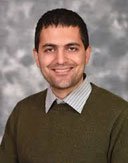Upcoming SPS Webinar Series: Signal Processing and Computational Image Formation (SPACE)

SPS Webinar Series: SPACE
(Signal Processing And Computational imagE formation)
Given the impossibility of travel during the COVID-19 crisis, Computational Imaging TC is launching an SPS Webinar Series SPACE (Signal Processing And Computational ImagE Formation) as a regular bi-weekly online seminar series to reach out to the global computational imaging and signal processing community.
The seminar series will use the Zoom Webinar platform, and at each seminar one keynote speaker will give a lecture, which is followed by Q&A and discussions.
SPS Webinar Series: SPACE | Confirmed Speakers (Series 1-7)
|
|
Upcoming Webinar @ SPACE - 19 May 2020
Webinar Title: "Joint Design of Optics and Post-Processing Algorithms
Based on Deep Learning for Generating Advanced Imaging Features"
Presented by Dr. Raja Giryes
| Presenter: Date: Time: Duration: Register: |
Dr. Raja Giryes 19 May 2020 11:00 am EDT (New York time) Approximately 1 hour Webinar Registration |

The IEEE Signal Processing Society would like to express our concern and support for the members of our global community and all affected by the current COVID-19 pandemic. We appreciate your continued patience and support as we work together to navigate these unforeseen and uncertain circumstances. We hope that you, your families, and your communities are safe!
About this topic:
After the tremendous success of deep learning (DL) for image processing and computer vision applications, these days almost every signal processing task is analyzed using such tools. In the presented work, the DL design revolution is brought one step deeper, into the optical image formation process. By considering the lens as an analog signal processor of the incoming optical wavefront (originating from the scene), the optics is modeled as an additional “layer” in a DL model, and its parameters are optimized jointly with the “conventional” DL layers, end-to-end. This design scheme allows the introduction of unique feature encoding in the intermediate optical image, since the lens “has access” to information that is lost in conventional 2D imaging. Therefore, such design allows a holistic design of the entire IP/CV system.
The proposed design approach will be presented with several applications: an extended Depth-Of-Field (DOF) camera; a passive depth estimation solution based on a single image from a single camera; non-uniform motion deblurring; and enhanced stereo camera with extended dynamic range and self-calibration abilities. Experimental results will be presented and discussed. This is a joint work with Shay Elmalem, Harel Haim, Yotam Gil Alex Bronstein, and Emanuel Marom.
About the presenter:

Raja Giryes is an assistant professor in the school of electrical engineering at Tel Aviv University. He received the B.Sc. (2007), M.Sc. (supervision by Prof. M. Elad and Prof. Y. C. Eldar, 2009), and Ph.D. (supervision by Prof. M. Elad 2014) degrees from the Department of Computer Science, The Technion–Israel Institute of Technology, Haifa. He held a postdoctoral position at the computer science department at the Technion (from November 2013 to July 2014) and at the lab of Prof. G. Sapiro at Duke University, Durham, USA (July 2014 and August 2015).
His research interests lie at the intersection between signal and image processing and machine learning, and in particular, in deep learning, inverse problems, sparse representations, computational photography, and signal and image modeling.
Dr. Giryes received the EURASIP best Ph.D. award, the ERC-StG grant, Maof prize for excellent young faculty (2016-2019), VATAT scholarship for excellent postdoctoral fellows (2014-2015), Intel Research and Excellence Award (2005, 2013), the Excellence in Signal Processing Award (ESPA) from Texas Instruments (2008), and was part of the Azrieli Fellows program (2010-2013). He has organized workshops and tutorials on deep learning theory in various conferences including ICML, CVPR, and ICCV. He serves as a consultant in various high-tech companies including Innoviz technologies. A computational imaging technology he has developed at Tel Aviv University together with Prof. David Mendelovic serves as the basis for the MultiVu technologies startup that he has co-founded in 2019.

